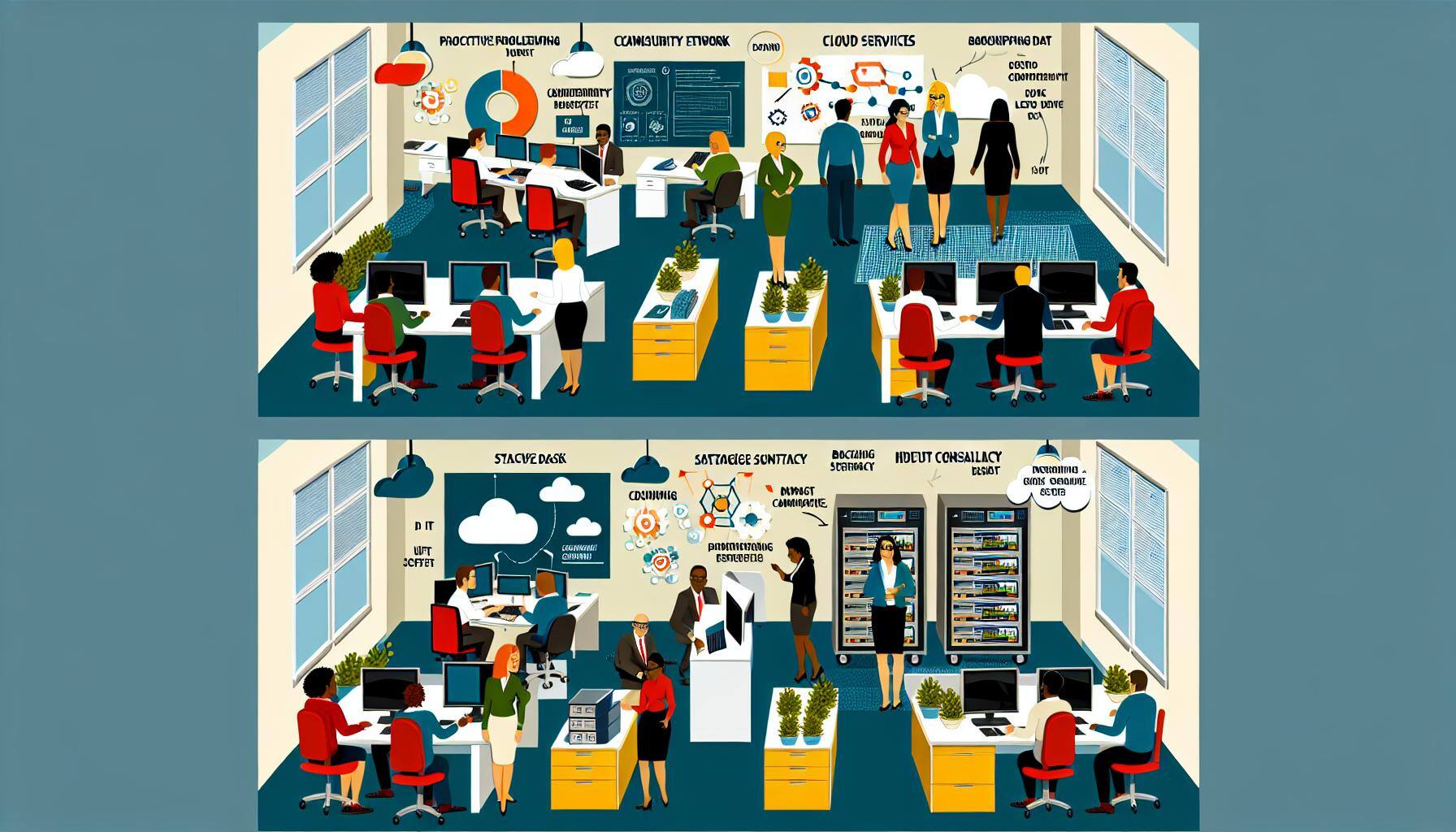What Is IT Managed Services? A Guide for Small Business Owners
In today’s fast-paced digital world, small businesses face a unique set of challenges when it comes to managing their IT infrastructure. From...

In the dynamic world of business technology, small businesses are finding that smart investment in IT services can significantly contribute to their success. Effective management of IT infrastructure isn't just about keeping the lights on; it’s about enhancing operational efficiency and securing a competitive edge in a crowded marketplace. Managed IT services are tailored to streamline business operations and optimise technology investment, allowing companies to scale solutions according to their needs and focus on their core activities without the distractions of complex IT issues.
With cybersecurity threats on the rise, safeguarding business data has become paramount. A trusted managed IT service provider can fortify a small business against cyber-attacks, ensuring their customer and business data remain secure. Moreover, cloud computing presents opportunities for small businesses to enhance collaboration, agility, and performance, without the hefty price tag of traditional IT solutions. By leveraging expert support, small businesses can keep their systems up-to-date and aligned with their strategic goals.

As small businesses navigate the digital age, the intersection of technology and growth becomes undeniable. Smart investment in IT services provides not only efficiency but also competitive advantages necessary for scaling and innovation.
Technology serves as the backbone for business expansion in the contemporary market. Small businesses that leverage technology effectively can outpace their competitors by automating processes, which enhances productivity. The integration of AI and data analytics empowers these businesses with insights that guide better decision-making and identify growth opportunities. This transformation is not merely about technological adoption but also about adapting business models to harness these tools for tangible benefits.
In today's market, IT services are a game-changer for small and medium-sized enterprises (SMEs). These services offer a systematic approach to managing companies' IT needs, ensuring that they are not only up-to-date with the latest innovations but also secure and efficient. By offloading IT responsibilities to specialists, small businesses can concentrate on core activities. Managed IT services provide access to a broad range of expertise that small businesses could otherwise not afford, making this a strategic move for growth. Moreover, the scalability of these services means that as a business grows, its IT infrastructure can adapt seamlessly, avoiding unnecessary costs and fostering efficiency.
In today’s digital landscape, cybersecurity is not just a technicality but a critical pillar in safeguarding a company's reputation and continuity. Smart small businesses acknowledge that robust security measures are fundamental to their success.
Small businesses are increasingly targets for cybercriminals due to often underestimating the risk of attack. Cyber threats range from malware and phishing to more sophisticated ransomware attacks. These can disrupt operations and compromise sensitive data security. Implementing a proactive defence system minimises the potential for such incursions, protecting both the company and its clientele from the damaging consequences of data breaches.
To fortify against cyber risks, it's essential to deploy robust security measures. This strategy encompasses a variety of initiatives:
Cybersecurity isn't just an IT issue; it's a business imperative. Smart investment in IT services that prioritise security measures can reap long-term rewards by preventing interruptions and maintaining customer trust.
In the modern business landscape, cloud computing is the cornerstone that enables small businesses to enhance their operational efficiency and respond to market demands with agility.
Cloud services offer a level of flexibility that traditional IT models cannot match. This elasticity allows businesses to adjust resources on-the-fly to handle increasing workloads or to scale down during slower periods.
Scalability is another pivotal advantage of cloud computing, permitting businesses to scale resources to support growth without costly investments in physical infrastructure.
By integrating cloud computing solutions, small businesses gain the robustness needed for expansion and the assurance that they can recover swiftly in the event of data loss or other disasters.
Smart small businesses recognise that an excellent customer experience is critical to their success. Investing in IT services elevates this experience, ensuring that customer interactions are not just transactions, but part of an ongoing relationship that grows in value over time.
Personalisation is a cornerstone of modern customer experience. By employing advanced IT services that leverage technology, small businesses can tailor interactions and offerings, making clients feel uniquely valued. For instance, AI-driven recommendation engines can analyse past purchases and browsing behaviour to suggest products that align with individual preferences.
Consider this scenario: A user visits an online retailer's website. The system, using personalisation algorithms, displays items that match their style based on previous interactions. This approach demonstrates a commitment to relationship management, enhancing the customer's shopping experience.
The judicious use of customer data can transform how a business interacts with its clientele. Comprehensive customer relationship management (CRM) systems can compile data from various touchpoints and provide actionable insights into customer behaviour and preferences.
For example, data analytics tools can reveal trends and patterns in purchasing, allowing businesses to predict future needs and respond proactively. Here's a visual breakdown of how data can improve the customer experience:
Employing these IT services effectively demands a high level of expertise. As an MSP, our role is to implement these technologies seamlessly into your business, ensuring that every customer feels heard, valued, and understood. By partnering with us, you leverage our expertise to focus on what matters most: building lasting relationships with your customers.
Investing in IT services to handle compliance and data security is not only prudent; it's a strategic move. As businesses strive to protect sensitive information and stay abreast of constantly evolving regulations, professional assistance can provide a reliable path to compliance and robust data security.
Navigating the complex web of regulations requires in-depth knowledge that small businesses may not have in-house. This is where Managed Service Providers (MSPs) step in, armed with expertise in regional and industry-specific compliance standards. They act to mitigate risks associated with non-compliance, which can range from fines to reputational damage.
Sensitive information is the lifeline of any business. Protecting this data is critical to maintaining trust and operational integrity. MSPs utilise advanced data security measures and tailor them to suit specific business needs.
By channeling adequate resources to these areas, businesses can fortify their defences against cyber threats and data breaches. An MSP can offer the expertise and tools necessary to implement comprehensive data security strategies that align with a business's unique requirements.
In an age where time is money, smart small businesses are turning to IT services that streamline everyday operations, freeing up valuable resources and enhancing efficiency. Achieving operational excellence is a multi-faceted endeavour, but two critical aspects stand out: automating routine tasks and refining project management strategies.
Leveraging automation is key for small businesses aiming to enhance their operational efficiency. Tools that automate mundane tasks can significantly reduce the time staff members spend on repetitive work. This not only boosts productivity but also allows employees to focus on more complex, revenue-generating activities.
Document Handling: AI integration can massively streamline document management. For instance, AI-powered camera features can assist businesses with document scanning and create augmented reality for product visualisation. AI Productivity tools often come with the capability to automate these processes.
Customer Engagement: Businesses can also implement automated response systems for customer inquiries. Utilising tools that intelligently interact with customers helps manage workload and drive customer satisfaction.
Effective project management is critical for maintaining a competitive edge. It's about doing more with less—less time, less money, and fewer errors.
Collaboration Techniques: Sophisticated project management software enables teams to collaborate in real-time, keeping all members on the same page and moving towards common objectives without unnecessary delays.
Performance Tracking: Dashboards and analytics play a pivotal role in assessing project performance. They offer insights into what's working and what's not, allowing for quick strategy adjustments to meet project timelines and budgets.
In summary, investing in IT services that offer automated solutions and robust project management capabilities is a strategic move for small businesses. It not only optimizes operations but also positions these businesses for sustainable growth and success.
Smart small businesses understand that investing in their team's capabilities is not just a necessity but a strategic move towards future-proofing the company. They focus on creating a tech-savvy workforce that is comfortable with the latest technologies and ongoing learning resources that support continuous professional development.
In today’s fast-paced business environment, having a workforce that is proficient in technology is paramount. Investing in employee training ensures that staff members can navigate and utilise modern IT solutions effectively. Employers should aim for agility in their training approaches, seamlessly integrating new methodologies and encouraging a culture of collaboration. A tech-savvy team can adapt quickly to new challenges, maximising efficiency and keeping the business competitive.
Provision of resources for ongoing development is crucial for maintaining an educated and dynamic workforce. Smart businesses allocate funds for online courses, webinars, and professional certifications. They also facilitate collaboration tools that allow employees to share knowledge and best practices, fostering a community of learning.
Investing in these areas not only boosts the competencies of employees but also contributes to the retention of top talent. When businesses invest in their people, they cultivate a workforce that is capable, flexible, and loyal.
Investing in managed IT services equips small businesses with a competitive edge through access to specialised expertise and proactive support structures. These services optimise operations, offering a clear path to appreciable return on investment and cost savings.
Small businesses often lack the resources for a full-scale IT department, yet through Managed IT Services, they gain access to a team of experts. Highly skilled personnel handle complex IT tasks, offering the highest standards in tech support. This partnership delivers proactive maintenance, ensuring IT infrastructure remains robust and resilient against emerging threats and technological advances. The added value of such comprehensive support structures is immense, leading to increased uptime and productivity—a competitive edge that is crucial in today's fast-paced market.
When small businesses choose Managed IT Services, they typically benefit from a cost-effective model that transforms unpredictable IT expenses into consistent monthly payments. This allows for better budgeting and significant cost savings in the long run. With experts proactively handling IT needs, the risk of expensive downtime is minimised, and the business is poised to leverage technology in ways that contribute to tangible return on investment (ROI). Managed services not only decrease the need for capital investment in in-house IT management but also can lead to a stronger financial standing by allowing companies to allocate resources more strategically.
In the swiftly evolving business landscape, smart small businesses are recognising the need to adapt by integrating cutting-edge remote work technologies and ensuring sustainability for ongoing business continuity.
Effective adaptation to the future of work hinges on the incorporation of robust remote work solutions. Investments in platforms that facilitate collaboration amongst team members, who may be dispersed geographically, are vital. Such tools include:
For instance, small businesses can advance their operations by adopting technologies that enhance teamwork and productivity, irrespective of physical location.
A sustainable approach to business technology not only addresses environmental concerns but also ensures resilience in the face of disruptions, contributing to business continuity. Key strategies include:
Emphasising sustainability in IT services leads to a more resilient business model capable of withstanding various challenges. This foresight positions small businesses to thrive amidst the evolving expectations of the future workplace.
In today’s fast-paced market, small businesses that harness emerging technologies can distinguish themselves as industry front-runners. Navigating the current tech landscape requires both awareness of tech trends and the deployment of innovative IT solutions to remain competitive.
Keeping a close eye on Big Tech's movements is crucial for staying relevant. Giants such as Google, Amazon, and Microsoft consistently set benchmarks in technological innovation. By monitoring their latest tech trends, small businesses can gain insights into new tools and services that can streamline operations. For instance, advancements in artificial intelligence by these firms can provide small businesses with powerful customer engagement tools that were once the reserve of larger corporations.
Staying informed on tech trends also includes recognising the impacts of emerging software and hardware on the industry. Technologies such as cloud computing and Big Data analytics are no longer optional but vital for a competitive edge. Understanding the implications of these technologies is essential for making informed decisions on IT investments.
Investing in innovative IT solutions is a key strategy for gaining and sustaining a competitive advantage. Tailored cloud services enable seamless collaboration and data access from anywhere, which is especially beneficial in the evolving remote work landscape. Moreover, approaches like as-a-service offerings—ranging from Software as a Service (SaaS) to Infrastructure as a Service (IaaS)—allow small businesses to utilise advanced tech without significant upfront investments.
Security is another critical area where innovation must not be overlooked. Cyber threats continue to evolve, and safeguarding data with cutting-edge security measures is a non-negotiable aspect of modern business. Implementing proactive security solutions not only protects operations but also demonstrates to customers that their data is taken seriously—a factor that can significantly enhance a company's reputation.
In this section, we address some key queries that smart small businesses may have when considering the engagement of a Managed Service Provider (MSP) for their IT needs.
Engaging an MSP offers small businesses access to comprehensive IT expertise and round-the-clock support. This partnership enables them to minimise downtime and leverage the latest technologies without bearing the full cost of an in-house IT team.
Outsourcing IT services allows small businesses to streamline operations and focus on core business activities. An MSP can optimise IT infrastructure, ensuring systems run smoothly and efficiently, freeing up internal resources for strategic pursuits.
MSPs provide insights into emerging technologies and industry best practices, guiding small businesses towards innovative solutions. They enable firms to pilot new tools and services that can create competitive advantages, without significant upfront investment.
Investing in professional IT services is crucial for maintaining cybersecurity, ensuring business continuity, and facilitating data management. An MSP safeguards against evolving security threats and ensures that IT frameworks support the business's objectives.
An MSP delivers scalable solutions that grow with the business. They assess future IT requirements and implement systems that can handle increasing workloads, ensuring technology is an enabler of growth rather than a bottleneck.
A partnership with an MSP offers small businesses long-term benefits such as cost savings on IT infrastructure, access to a broader range of skills and expertise, and proactive management of IT systems to prevent issues before they arise.

In today’s fast-paced digital world, small businesses face a unique set of challenges when it comes to managing their IT infrastructure. From...

When people think of cyberattacks, they often picture large corporations under siege. But here’s the reality: 43% of cyberattacks target small...

I speak to many SME business owners. For the Managing Directors, CEOs and senior leaders that run the 121,175 small and medium-sized businesses based...